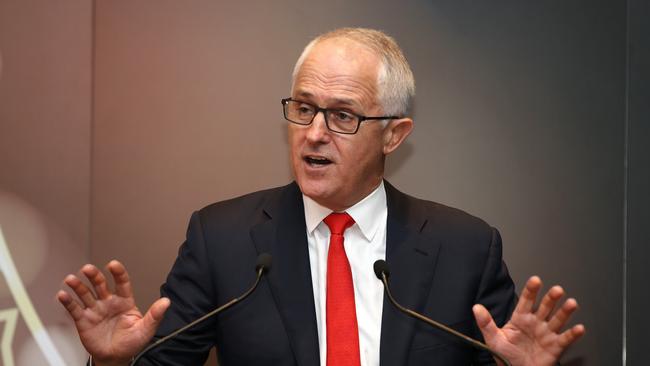
Christopher Pyne’s loose triumphalism has blown the lid off an issue that has simmered for months with speculation same-sex marriage would resurface in the Coalition partyroom. Liberal left MPs want this change on their watch, not Labor’s. Those on the right are holding fast to the election commitment that this matter must be decided by the people.
Pyne’s comments are incendiary; as Leader of the House, he has the power to manipulate the chamber like no other.
• Albrechtsen: B-teamers’ same-sex sideshow
The plebiscite position could be changed by a partyroom decision or by the Prime Minister declaring it a matter of conscience, a free vote.
Historically reserved for matters of life and death, in the end a free vote is the leader’s call. He has long been a public supporter of same-sex marriage, but Malcolm Turnbull can see the risk to his leadership if he abandons the commitment he took to last year’s election: the base won’t cop any further shift to the left and it would damage the coalition with the Nationals.
The other route for change is via legislation. Bills come in two types: a government bill sponsored by a minister and invariably adopted as policy; or a private member’s bill, put up by any MP and debated (rarely), and voted on (hardly ever).
Since the news of Pyne’s comments broke on Monday, Turnbull has said that “the government has no plans to change” its position. But speculation that Liberal backbenchers Trent Zimmerman and Dean Smith are working on a private member’s bill to bring about same-sex marriage as early as August is interesting.
As Turnbull said yesterday, private member’s bills aren’t automatically voted on: most are introduced and remain on the notice paper without a vote. Under the Coalition’s rules, they are circulated to the joint partyroom as a courtesy. Not being party-sanctioned policy, they sit outside the whips’ authority but don’t come on in the house without the government’s agreement.
Turnbull pointed to this usual practice in his 3AW interview yesterday when he said: “There have been private member’s bills proposed already about gay marriage. Our position is we do not support a bill relating to gay marriage being brought on until there has been a vote of the Australian people.”
Incidentally, while there have been a number of such bills, as Turnbull says, only one has made it to a vote in the House of Representatives. That was in 2012 and the Coalition partyroom reaffirmed its policy position in support of traditional marriage (not even a plebiscite then), and the prime minister then, Julia Gillard, famously voted down change too.
After Turnbull’s statement killing off support for a private member’s bill, as well as ruling out a free vote, most commentators were quick to say this was about as definitive as you can get that change won’t happen.
But that’s where they’re all wrong. And here’s where Pyne’s role as Leader of the House comes into play.
If the government officially refuses or fails to facilitate voting on a private member’s bill, the other way to bring it on is by suspending standing orders. As a tactical mechanism it’s invariably forgotten because it’s usually reserved for question time theatre, but it’s effective and powerful.
Under this scenario, assisted by the Leader of the House — who might, let’s say, give supporters a heads-up (even those from Labor) and keep opponents in the dark — a successful suspension vote would enable an immediate vote on same-sex marriage.
To get the suspension vote up, an absolute majority is required (76 votes), and while precedent requires that all MPs support policy even on procedural votes, a handful of Coalition MPs such as Zimmerman may be tempted to cross the floor to make LGBTI history.
A move such as this would signal complete collapse of the Prime Minister’s authority, and worse if orchestrated with the concurrence of his Leader of the House, but in the present febrile environment, it’s within the realm of possibility. Once a vote was under way on the substantive bill, Turnbull would then try to argue he must approve a free vote because mass floor-crossings would make his leadership untenable. As he would not have sanctioned a change in government policy, he can argue he has kept his election commitment.
All Liberal MPs retain the right to cross the floor; in Labor it earns you expulsion. For ministers, it will cost them their frontbench position but for backbenchers there’s very little opprobrium; after all, Turnbull crossed the floor to support Labor’s emission trading scheme after he lost the leadership in 2009. Now he’s Prime Minister.






To join the conversation, please log in. Don't have an account? Register
Join the conversation, you are commenting as Logout